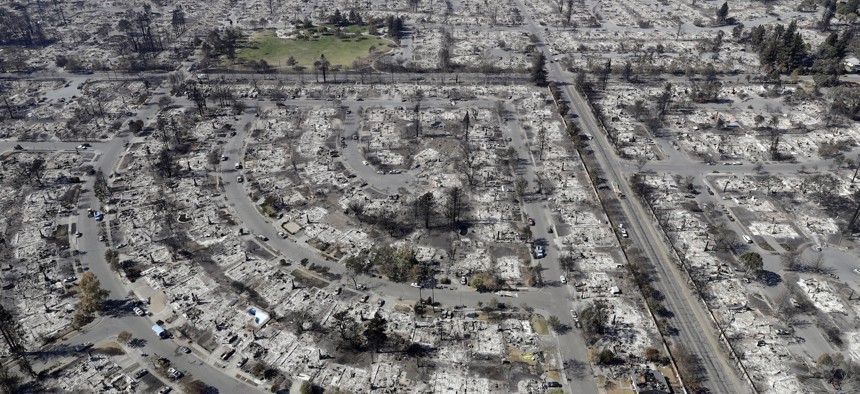Rethinking Hazard Mapping After Wildfires Entered Urban Areas Thought to Be ‘Unburnable’

The Coffey Park neighborhood in Santa Rosa, California following last week's wildfire. Marcio Jose Sanchez / AP Photo
Local officials across the West should pay attention to what happened to one devastated neighborhood in Santa Rosa, California.
While California is no stranger to wildfire disasters, the recent blazes in Napa and Sonoma counties and elsewhere will be remembered for years for their ferociousness, destruction and death toll, which as of Sunday night stood at 41, including many elderly people who weren’t able to escape the flames. That number, as local officials have warned, could continue to rise.
The past week has been the most deadly in California when it comes to wildfires. In 1933, a fire in Los Angeles’ Griffith Park killed at least 29 people and in 1991, the Oakland Hills firestorm killed 25 people.
While that blaze 26 years ago destroyed nearly 3,500 structures , the fire’s perimeter was mostly contained to neighborhoods in the hilly terrain that forms the eastern flank of the cities of Oakland and Berkeley. Firefighters were able to keep it from spreading down into urban areas.
Last week, the quickly moving, wind-whipped Tubbs Fire took many by surprise when it moved down from hillier terrain into more urbanized areas of Santa Rosa, the largest city in Sonoma County. Embers jumped over the six-lane U.S. 101 freeway and into a middle-class neighborhood called Coffey Park, located north of the center of the city of 175,000 residents.
Many of the shocking and heartbreaking photos coming out of the Northern California fire zone this past week were from this neighborhood, which sits in the “ wildland-urban interface ,” the term used to describe populated areas on the fringes of or built amid the forests, canyons, hills and other natural areas where wildfires often prove to be the most destructive.
Upwards of 5,700 structures have been destroyed in the recent Northern California blazes. Nearly 3,000 of those were in Santa Rosa , including in places like Coffey Park that were thought to be “unburnable” by wildfires.
Coffey Park, which the Los Angeles Times has described as a neighborhood built “on city streets, not forested country lanes,” was particularly hard hit despite being outside the “very severe” fire zone in the hilly terrain a few miles to the east—the homes there wasn’t subject to certain building codes meant to make structures more resistant to wildfires.
But fire scientists, including Max Moritz of the University of California's Cooperative Extension, have described the destruction in Coffey Park as “a rare, but predictable, event that has exposed flaws in the way fire risk is measured and mitigated in California,” according to the L.A. Times , which continued :
... [T]he Coffey Park catastrophe has shown that the methodology, and the law underlying it, were too narrow.
"With a lot of hazard mapping, once you get into a density of development, it's mapped urban and it's considered unburnable," Moritz said. "From its core, our whole approach to fire behavior modeling, we are not talking about burning in urbanized environments."
The fire hazard zones now need to be recast with more consideration for the impact of wildland fire on developed areas, Moritz said.
There are, not unexpectedly, many more places like Coffey Park across California and in other parts of the West.

Growing medium-size cities like Bend, Oregon and Boulder, Colorado, face similar risks as do larger population centers like Los Angeles, which saw its largest-ever wildfire this summer. In early September, the La Tuna Fire raged through the hills near Burbank but was brought under control thanks to some favorable weather conditions before it could spread down into more dense and urbanized neighborhoods.
All it takes is the right set of weather conditions and the right type of topography to create a worst-case wildland fire scenario where the a difficult-to-control blaze spreads into a heavily populated area.
Some fires, like the one that burned into Santa Rosa, are simply too strong to assume they’ll not spread from the wildland-urban interface and into an urban neighborhood. And that should frighten any city whose residents might assume they’re just out of reach from a wildfire disaster.
PREVIOUSLY on Route Fifty :
Editor's Note: This article has been updated to clarify language about how embers, and not flames, in Santa Rosa moved across U.S. 101 and into the Coffey Park neighborhood.
Michael Grass is Executive Editor of Government Executive's Route Fifty and is based in Seattle.
NEXT STORY: Two City Leaders Reflect on Hurricane Response and Recovery






